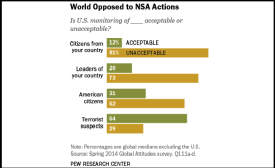spying
Countries join alliances, or entities such as the European Union, because these groups make the benefits and obligations of membership as unambiguous as anything in international relations can be. For Germany and South Korea, however, relationships with historic allies — NATO and the United States, respectively — appear to be changing before our eyes.

How the world views the U.S., China, and the competition between the two major rivals.
Germany and the United States sought on Sunday to restore vital ties badly frayed by a spying row which led to the expulsion of the CIA station chief in Berlin. Secretary of State John Kerry emerged from talks with his German counterpart Frank-Walter Steinmeier to offer reassurances that the two vital transatlantic allies remain "great friends". In a bid to lighten the atmosphere and use sports diplomacy, Kerry even wished his counterpart "good luck" in Sunday's football World Cup final when Germany will take on Argentina.
The German authorities have summoned the US ambassador in Berlin after a man was arrested on suspicion of spying. The US diplomat "was asked to help in the swift clarification" of the case, the foreign ministry said. German officials confirmed the arrest but released no other details. US-German ties were strained after allegations last year that the US National Security Agency (NSA) bugged Chancellor Angela Merkel's phone as part of a huge surveillance programme.
In an unprecedented, three-year cyber espionage campaign, Iranian hackers created false social networking accounts and a fake news website to spy on military and political leaders in the United States, Israel and other countries, a cyber intelligence firm said on Thursday. ISight Partners, which uncovered the operation, said the hackers' targets include a four-star U.S. Navy admiral, U.S. lawmakers and ambassadors, members of the U.S.-Israeli lobby, and personnel from Britain, Saudi Arabia, Syria, Iraq and Afghanistan.
Chinese web users scoffed and Beijing expressed outrage at the May 19 announcement of a U.S. indictment of five Shanghai-based army officers on charges of hacking and economic espionage. In an uncharacteristically speedy response posted to the Foreign Ministry website within 90 minutes of the US announcement, spokesman Qin Gang called the accusations "absurd" and "purely ungrounded." Qin demanded that U.S. authorities drop the case immediately and added that Beijing would be suspending its participation in Sino-U.S.
When Fernando Gonzalez walks out of an Arizona prison next week, the "Cuban Five" will be down to three. Intelligence agents in the employ of Fidel Castro's Cuba, they were arrested in the United States in 1998 and given terms ranging from 15 years to consecutive life sentences on charges including conspiracy and failure to register as foreign agents.
Europeans were largely underwhelmed by Barack Obama's speech on limited reform of US espionage practices, saying the measures did not go far enough to address concerns over American snooping on its European allies.







